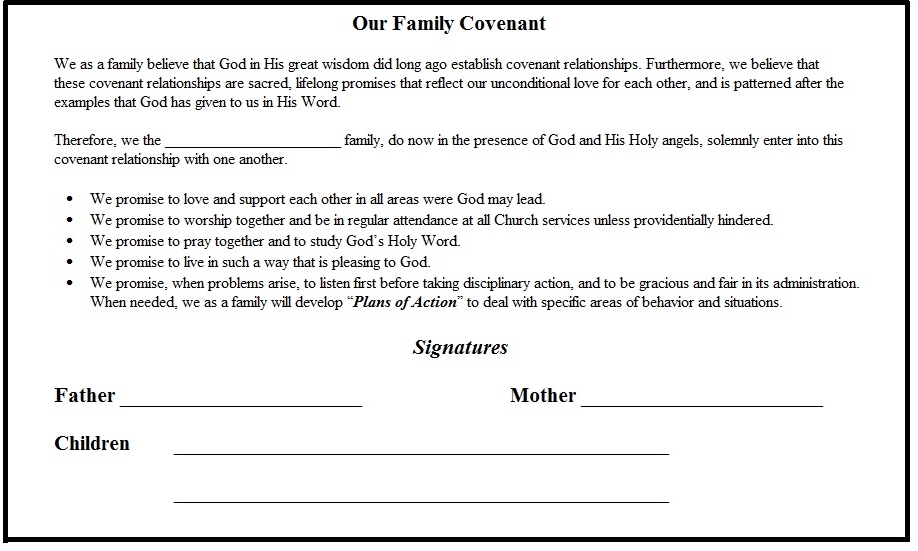|
There are no words that do this story justice. Watch and be amazed.
0 Comments
The Puritan ethic of marriage was first to look not for a partner whom you do love passionately at this moment but rather for one whom you can love steadily as your best friend for life, then to proceed with God's help to do just that. J.I. Packer  Marriages are constantly under attack today, and the Christian home is not exempt. The numbers can be overwhelming and sometimes misleading. People are waiting longer to get married in our culture, but this isn’t necessarily a good thing. More couples are choosing to cohabitate than ever before and only consider marriage after the fact. The truth is most couples who choose to live together outside of marriage end their relationship within the first five years. Those who do marry often face greater issues which eventually lead to divorce for a significant number. Here are some startling facts:
The Church has a responsibility to proclaim the truth of God’s design for marriage as outlined in His Word. This design is reflected in the relationship God the Father has with Israel, and the relationship Christ has with His Church. The formula is very simple; one man plus one woman in a holy union for life, (Genesis 2:23-24). Cohabitation outside the bond of marriage is sin, and in the long run weakens the family unit because of the philosophical mindset from which it was entered. The justification of sinful behavior is always counterproductive and usually destructive.
Please don’t misunderstand. Many relationships begin sinfully, but the potential long term damage of the sin of cohabitation can be limited through repentance. I’ve dealt with many couples wishing to marry who began by cohabitating, and my advice is always the same – STOP. Confess your sin and repent; then we can begin in earnest with the premarital work that needs to be done, and help limit the possibility of a future divorce. As the Body of Christ we have a responsibility to strengthen and equip families for the rigors of daily life. Christian homes and relationships are just as susceptible to caustic cultural trends and philosophies as are non-Christian. So how do we strengthen and equip Christian couples and families? First and foremost through the sound teaching of God’s Word. In Coaching and Pastoral Care I often share with others that once we've been made aware of why we do the things that we do, we no longer have an excuse to continue with the same behaviors. In reality there’s never a good excuse for our sinful actions. Second, we’re to hold husbands and wives, moms and dads, and as members of one another in the Church accountable to the commitments we've made. Scripture reveals God is serious about commitments, and we should be too as followers of Christ. Lastly, the Church needs more long time Christian couples to mentor newly married couples. The truth be told, I believe the mentoring process should begin during courtship. Older established couples have a perspective that only comes with experience, and this knowledge can aid young couples in heading off potential problems. Blessings, Rod The statistics above are support by a number of resources: http://www.cdc.gov/nchs/fastats/divorce.htm https://www.barna.org/ http://www.foryourmarriage.org/ http://www.pewsocialtrends.org/search/marriage+and+divorce/  This has been VBS week in the church where I serve, and once again as the week draws to an end the children are still full of energy and the workers are dead tired. Like other churches that hold this annual event all the children come from various backgrounds. There are obviously ethnic differences as well as economic and religious differences, yet each child is unique personally with their own traits and tendencies. Their behaviors run the gamut from the gregarious and rambunctious to the meek and mild wallflower. Clearly some of these children need more attention from adult staff because of their uniqueness. A few of our workers have devoted much of their time to the special needs of some children because of certain behaviors exhibited, and this reminded me of the first position I held after graduating from Liberty University. In 1986 I began working in a children’s group home for Forsyth-Stokes Mental Health near Winston-Salem North Carolina. My primary task was twofold; develop behavior plans for the aggressive and assaultive children living in the home, and to also help the staff with the implementation of these plans. Working directly for the state of North Carolina I was led to believe the Christian model of psychology couldn’t be used for these particular children. Being limited to the use of only secular models and philosophies in developing these behavior plans prove to be frustrating for me. After a few months I found most of the staff, (which were all trained at secular universities), having a greater influence upon me than I did upon them. The descriptive phrase, “young and dumb” fit me perfectly, and it wouldn’t be until several years later that I realized Christian principles and practice need not be limited to only religious settings. What I discovered was that the Christian model of psychology, counseling, and coaching can work just as well in a secular setting because of the sure foundation upon which it is built. Scriptural principles always work because they’re God directed no matter what a person does or doesn’t believe. Human beings are limited but God is not. I’ve worked with many couples and families through the years that might well be considered “Christian” in name only, yet many of the strategies and techniques used with traditional Christian families often works for them too. Once again the reasons these tactics work is because they’re fixed in the truth of Scripture. This brings me to my main point in regards to behaviors and Christian principles. Although the behaviors during VBS were much milder than those I saw in the group home setting in 1986 they’re still rooted in the same soil. Children are egocentric and naturally sinful. This isn’t meant to be a derogatory statement but a statement of fact. That cute little child that makes you laugh and smile with the little things they do and say can turn on you in a heartbeat. As I’ve said many times before, “No parent has ever had to teach his or her child how to be bad.” We are born with a predisposition to sin, and what we need is for someone or something to teach us how to be good. I can’t tell you the number of times I’ve heard adults make this statement about an unruly child, “he or she just needs to be loved.” I agree every child needs to be loved, but that love needs to be demonstrated with discipline and consistency. These two aspects or characteristics of love fall under the broader idea of commitment. As parents we need to exhibit the type of love and commitment to our children that God has demonstrated toward us. It isn’t our words which display this commitment but our actions. Hebrews 12:7-11 (ESV) It is for discipline that you have to endure. God is treating you as sons. For what son is there whom his father does not discipline? 8 If you are left without discipline, in which all have participated, then you are illegitimate children and not sons. 9 Besides this, we have had earthly fathers who disciplined us and we respected them. Shall we not much more be subject to the Father of spirits and live? 10 For they disciplined us for a short time as it seemed best to them, but he disciplines us for our good, that we may share his holiness. 11 For the moment all discipline seems painful rather than pleasant, but later it yields the peaceful fruit of righteousness to those who have been trained by it. No doubt some will read this and assume I’m advocating corporal punishment for every childhood transgression and nothing could be further from the truth. Personally, I did spank my children when they were young, but it was very limited and only for certain offenses. Now by no means am I suggesting that my wife and I have been the world’s greatest parents, but we did make certain agreements that we believe made a difference in rearing our children.
First, we made a covenant commitment that we would love each other no matter what the other said or did, and that divorce would never be an option. We thought it important that our sons see us live out this covenant commitment especially when times were tough. Second, we made a commitment that our children would be raised in a Christian home and in the Church. It was important to both of us that our children see us pray and study the Word of God, as well as carrying out ministries through the local church. Our thought was, “How can we expect our children to live committed lives of discipline and consistency if we didn’t?” Now to be frank with you there were times we failed, but fortunately when one faltered the other remained strong with God’s help. As for the writer of Hebrews, the discipline he speaks of took on various forms. God’s discipline is always as a loving Father based upon the covenant relationship He has entered into with His people. No matter the type of punishment God carries out, it’s always to restore our broken relationship with Him, and is in conjunction with the covenant established by Christ through the cross. The passage above indicates that when discipline is carried out correctly it results in changed behavior and respect for the one who disciplines. This brings me to my second point and the use of covenants. Our God is a covenant God, meaning He has entered into a relationship with each believer built upon a promise that cannot be broken. The word covenant means “testament,” and in essence is a sealed treaty or agreement between two parties that can only be terminated by death. The Scriptures are ripe with covenant agreements especially in the Old Testament. God entered into covenant agreements with Abraham, Noah, and David just to name a few. The relationship He has with Israel is spoken of in covenantal terms just as the relationship Christ has with His Church. Every marriage is a covenant relationship, and I believe every family has a covenant relationship whether they acknowledged it or not. With each covenant there are certain promises we make to one another. As parents there are certain promises and agreements we make to our children simply by the act of becoming a parent. As Christians we believe God has entrusted children to us as stewards with the idea that we will nurture and raise them in accordance with His commands. To make a long story short, while working on my Master’s degree it occurred to me that as Christians we need to help every family be as strong as they can possibly be in order to survive the rigors of this life. I thought why not take the approach God did with Israel and the Church since He is the Originator of covenant relationships. What if we could aid moms and dads who have children with behavior issues by helping them create and write their own family covenant? This would be a tangible way of demonstrating our commitment to one another in the home, and providing new and innovative ways to deal with the problems that often arise. Below is a picture of an actual Family Covenant that you are free to use. Every family covenant should have certain “nonnegotiables” based upon core values, and a statement on “Plans of Action.” These plans deal directly with certain problematic behaviors and change as the child ages. If you’d like to know more on how to develop a Family Covenant of your own, or “Plans of Action” for your child/children please don’t hesitate to contact me. Blessings, Rod  As we approach Father’s Day I want to share a few thoughts concerning Christian men in the home. Specifically I want to focus on husbands and fathers in regards to leadership and biblical manhood. In order to do this lets ask a few questions. “How do we know what our true roles as husbands and fathers are to be?” “How do we know if we’re being good husbands and fathers?” “Who taught us about being husbands and fathers? And who will teach the next generation of men?” The truth of the matter is most of us were taught long ago something about being husbands and fathers although we may not have realized it or always had the best teachers. Our fathers and grandfathers, possibly stepfathers, uncles, teachers, or neighbors unwittingly served as our models. I don’t remember a class in school ever addressing the topic of how to be a good husband or father and maybe there should have been. What I learned about being a man, husband, and father was by watching not only my father but other adult men in my life. Suffice it to say, I didn't always have the best models and ended up making some of the very mistakes as those I was observing. As Christian men we need to always keep this one thing at the forefront of our thinking; someone is always watching us. Our wives are depending on us to be good leaders in our homes. Our sons are not only watching us but learning from us as well. Our daughters will often make their choice of a husband based on what they see in the life of their daddy. The Scriptures have much to teach us concerning who we are to be as husbands, fathers, and the role of biblical manhood. Here are four biblical points for us to remember this Father’s Day. 1. Every husband is accountable to God for his wife, children and home. So often throughout my ministry I’ve heard Christians jokingly say that all our issues with sin are to be blamed on Eve because of her actions in the Garden of Eden and nothing to be further from the truth. The events of Genesis 3 of the serpent tempting Eve are often misconstrued by making the woman a scapegoat. A closer examination reveals that Adam was with his wife when she took of the forbidden fruit and failed in his responsibilities. This is not to make an excuse for Eve, but it should be noted that when God pronounces judgment He pronounces it last upon Adam who was ultimately responsible for his wife. In Genesis 2:16 – 17 God had instructed Adam concerning the tree of knowledge of good and evil and that it was not to be eaten from. It was Adam’s responsibility to not only teach his wife the law of God that had been given to him, but it was also his responsibility to protect Eve by standing between her and Satan. Doctor Tony Evans once made the following statement: “… Satan focuses his attacks on the husband-wife relationship because by destroying that he destroys children and families too. He who controls the family controls the future.”[1] 2. Christian husbands and fathers are to represent God in the home. When our wives look at us they should see Christ through our words, actions, and character. Along the same lines our children should also see God the Father. If you want to be the leader that your wife and children will follow then you must first be a follower yourself. This relates back to our first point in which Eve would not have attempted to supersede the authority of Adam had he been the leader he was supposed to be as designed by God. We have no real authority to lead our families apart from God meaning we must first be totally surrendered to His Lordship. 1 Corinthians 11:1-3, 8-12 (ESV) Be imitators of me, as I am of Christ. 2 Now I commend you because you remember me in everything and maintain the traditions even as I delivered them to you. 3 But I want you to understand that the head of every man is Christ, the head of a wife is her husband, and the head of Christ is God. … 8 For man was not made from woman, but woman from man. 9 Neither was man created for woman, but woman for man. 10 That is why a wife ought to have a symbol of authority on her head, because of the angels. 11 Nevertheless, in the Lord woman is not independent of man nor man of woman; 12 for as woman was made from man, so man is now born of woman. And all things are from God. 3. Modeling for our children a proper view of a marriage begins with a right attitude or thinking about love. We are to love our wives in the same way that Christ loved the Church according to the Apostle Paul, (Ephesians 5:25 – 26). This is a type of love that goes beyond mere feelings of affection. This is a love that is sacrificial and long-suffering. As Christ willingly gave Himself for His Bride, the Church, we also are to demonstrate a willingness to die to self. This is the love that God the Father has shown to the world, (John 3:16). Our children will learn how to love their future spouse because of the unconditional love they witnessed in us as husbands and fathers. It should also be noted that none of us fall in and out of love. Love is a choice we consciously make and is best demonstrated by God in John 3: 16. Many believe they can fall out of love because they have become disenchanted with the other person in their life and have chosen to believe Satan’s lie that marriage is move from ecstasy to agony over time. The truth is, if Christ is at the center of our life and relationship then our marriages should be better and healthier as time passes. 4. If we’re truly to be united as one with our wives in marriage then we need to get the “leaving and cleaving” right from the beginning. Genesis 2:24 (NASB95) For this reason a man shall leave his father and his mother, and be joined to his wife; and they shall become one flesh. The “leave” in the passage above literally means we are to sever any and all ties that would come ahead of our wives. This doesn't mean we’re to alienate our families, but simply that our first priority next to Christ should be the relationship we have with our wife. This relationship is to be stronger than even the relationship we have with our children. And the word "cleave" is much more than having a physical relationship. It literally means that as husbands we are to seek to please our wives mentally, emotionally, and spiritually which leads to greater intimacy. Study after study has shown security is the number one issue for women in most marriages. In Genesis 2:25 it is written “And the man and his wife are both naked and were not ashamed.” Some have suggested, and I think rightly so, the idea of nakedness and not being ashamed refers to more than just physical nakedness. Adam and Eve were transparent with each other, meaning they were open to one another emotionally and spiritually which provided the security Eve needed while also meeting the needs of Adam for help mate. I close with two thoughts. I believe our wives should be our best friends in life, and when this happens true intimacy is achieved and makes the best marriages. Secondly, I leave you with another quote from Doctor Tony Evans. Creating a mate for Adam was God’s idea, not Adams. That reminds us that all of God’s plans are perfect. If you’re in a bad marriage, it’s not because God had a bad idea. Marriage is His ideal. It’s the partners in a marriage who turn it from an ideal into an ordeal, causing them to look for a new deal. [2] HD STATEMENT  Most of you know by now that HD stands for “High Definition,” and refers to an increase in the resolution or clarity a device provides as with high definition televisions and video. It’s almost hard to imagine, as a sports fan, watching any football or basketball game on television that’s not in HD anymore. In my opinion the clarity provided by this technology makes watching sporting events better than actually being at the event itself. Of course part of the enjoyment depends on the screen size, i.e. 60 inches of HD is better than 22 inches of HD. In a very real sense high definition has provided audiences the ability to see minute details of every play, both successes and failures, with greater clarity. In the digital age we live in Christian families need to have a greater sense of clarity in order to live victoriously for Christ. New information and changes come at such a rapid pace that if we’re not careful our families will be overwhelmed and rocked by a godless culture. HD families have a high degree of clarity in four areas.
For us to function as HD families, Jesus the Christ must be Lord of our lives and homes. In the late 80s Focus on the Family provided results of a study done by more than 500 family counselors looking at the traits of what makes a “successful family.” Granted, the study is dated but the results of that study support biblical principles which are never outdated. The four top traits for successful families are:
I encourage you to do two things. Continue towards spiritual maturity by growing your family through the Word of God. Faithfully keep putting into practice the biblical principles you’ve learned which are built upon the foundation of Christ Jesus.
Blessings, Rod  Anytime two people come together in a relationship to form a marriage there will always be periods of adjustment because we are attempting to forge one will out of two. It is only natural to have moments of conflict in a marriage, and this conflict is not only universal but inevitable. Another way of expressing this is there will always be a “Battle of the Wills” as two egocentric individuals attempt to merge into one flesh. Even the most loving couples will have disagreements and normally these disagreements begin with the “little things." We should be mindful that if we allow these “little things” to go unresolved they always turn into “big things." Most couples learn over time that resolving their conflicts or battles aren't easy. In the early years of a marriage we often use inadequate measures or techniques to try and solve our issues, some conscious while others are unconscious and typically unsuccessful. Here are five inadequate ways we attempt to resolve the “battle of wills."
So the real question is: “How do we resolve the dreaded battle of the wills?”
The answer we seek must be not only feasible, but first and foremost it must be biblical. God has called us to be “one flesh” in the marriage relationship and the solution is simple but not always easy. Both husband and wife must put self aside and DEFER TO A HIGHER AUTHORITY. The higher authority I speak of isn't marriage counselors or pastors; these people are often a good place to start if they’re Christ centered but they’re not God. Both people in a Christian marriage must independently yield their will to the will of God. As I began this blog one of the first things I said was a bit misleading when I stated, “there will always be periods of adjustment because we are attempting to forge one will out of two.” My statement is true but what is misleading is that in a Christian marriage there are THREE WILLS. His will, her will, and God’s will. It is God’s will that we should seek together, and when we do, the problems we have are never insurmountable. I've never had a marriage counseling situation where the problem couldn't be solved and divorce prevented if both were willing to place God’s will first. If you’re married now great! Continue to make your marriage better by seeking God’s will first, and always place the needs of your mate above your own. If you’re not married and want to be then prepare your heart and life now to be the blessing your future spouse deserves. You will never regret the effort you put forth, and your future partner will be eternally grateful. This is the last blog in the marriage series, and once again it is my prayer these writings have been a help to you or someone you know. There’s so much more we could cover about what the Bible teaches regarding the Christian marriage and home, but it’s time to move on. I will periodically revisit this topic as God leads, and the situation warrants. Blessings to you! Rod  1. We should strive to construct stronger bonds in our relationships by putting personal needs aside for the needs of our spouse, and when we fail to do so we fall short of God’s will. Strengthening the Christian relationship with our spouse is a necessity of life! (Philippians 2:1-7) 2. Accountability is a must in any marriage; if you foster a true friendship with your spouse accountability will naturally follow. (Galatians 6:1-3) 3. Real commitment involves sacrifice while rejecting worldliness by surrendering our minds to Christ for transformation! (Romans 12:1-2) 4. A Christian husband should be willing to do those things for his wife that may seem difficult at the moment in order to benefit the marriage for the long-term gain, and all the while he is to treat his wife with tender care. Sometimes this may go against our very nature but God has called Christian men/husbands to a higher standard. (1 Peter 3:7; Colossians 3:19) 5. A committed Christian wife is one who adores her man, and who seeks to increase her inner beauty through spiritual development! 1 Peter 3:1-4 (ESV) Likewise, wives, be subject to your own husbands, so that even if some do not obey the word, they may be won without a word by the conduct of their wives, 2 when they see your respectful and pure conduct. 3 Do not let your adorning be external—the braiding of hair and the putting on of gold jewelry, or the clothing you wear— 4 but let your adorning be the hidden person of the heart with the imperishable beauty of a gentle and quiet spirit, which in God’s sight is very precious. Two of the sexiest things my wife does is study her Bible each day and demonstrate her support in all I do by standing with me.
Blessings, Rod  For most, defining “love” is often a difficult task in which we search for words and phrases to describe a feeling the majority of society believes to be a natural act found within humanity. If you’ve read my previous blogs during the last three weeks then you’ll probably not be surprised by what you read here today. I believe love isn’t a feeling but in actuality is a supernatural act which can only be fully appreciated and understood through a biblical lens. In order to develop a definition for love we need to seek out an expert on the topic – God’s Word. 1 John 4:7-16 (ESV) Beloved, let us love one another, for love is from God, and whoever loves has been born of God and knows God. 8 Anyone who does not love does not know God, because God is love. 9 In this the love of God was made manifest among us, that God sent his only Son into the world, so that we might live through him. 10 In this is love, not that we have loved God but that he loved us and sent his Son to be the propitiation for our sins. … 12 No one has ever seen God; if we love one another, God abides in us and his love is perfected in us. … 16 So we have come to know and to believe the love that God has for us. God is love, and whoever abides in love abides in God, and God abides in him. The Apostle John puts it simply for us; God has established the standard of love by and through Himself. A secular view of love operates from a standard based upon a social structure, while God’s structure of love is spiritual in nature and absolute. Note the Apostle’s words at the end of verse eight, “Because God is love.” (As a side note some have perverted this statement through inversion by saying, “God is love therefore love is God” which is a heretical declaration.) The source of love is God and all true love must come through Him. It’s imperative that you keep this in mind as we attempt to define what “love” is. At this point the question normally arises, “Can non-Christians love also?” The answer is – “yes and no.” From a secular humanist viewpoint everyone is able to practice and experience love apart from God, but according to the Apostle John this seems to be impossible. Humanism teaches man’s ability to love another is worldly and social in nature because human beings are naturally capable as ethical, moral, and loving beings to do so. From a Christian viewpoint love is a spiritual act and therefore not natural but supernatural. Note the diagram below. God’s love for mankind is demonstrated and experienced by the giving of His Son Christ Jesus. Therefore love cannot be a natural work of mankind, and because this work is of God it is supernaturally enacted within the natural world. Note the second of diagram. A non-Christian can love another yet it's still only because it is based upon the finished work of Christ. Again, all true love must come through Him! So yes non-Christians can practice and experience love even without a full acknowledgment or understanding about the love they have for another. Just because one does not recognize the source of their love does not negate the work of God through His Son Christ Jesus. With this as our foundation for love we can now better understand the three primary words used for love in the koine Greek. The first is “eros” from which we obtained the word “erotic.” The meaning here is very base in its nature and is always related to sex. Eros is never found in the Bible. The second word is “philos” and is a love that is closely associated with friendship. The word “Philadelphia,” meaning brotherly love is derived from “philos.” This word is use some 25 times in the New Testament, but probably one of the best pictures of this type of love is found in the Old Testament with the relationship between David and Jonathan. The camaraderie they share reveals a deep sense of loyalty and trust and serves as an example of true friendship. The third word is “agape” and is usually described as a “Godlike” love. This love is best understood as an active choice of will regardless of feelings. Obviously John 3:16 is the perfect example in which God chose to demonstrate His love through His only begotten Son despite any feelings He may have had in regards to man’s failure. The key here is that God chose in eternity past to love us in spite of our sinful downfall. This level of commitment on God’s part always amazes me. Now certainly feelings are associated with “agape/love” but it is to be carried out in spite of the positive or negative feelings one may have for another. Man is surely capable of this type of love as revealed in passages such as Ephesians 5:25 – 30. In the Ephesians passage Christ uses Christian marriages as an illustration of His relationship with the Church; Christian husbands therefore are to sacrificially love their wives in the same manner as Christ loves His Bride. As stated in previous blogs we do not fall in and out of love, but we choose to love another by committing ourselves to a covenant relationship which is only voided by death, (I speak of marriage here). This is the type of love that says, “I’m committed to you today even though I don’t like you very much because of something you’ve said or done. You may have hurt me or made me angry but I still love you, and I’m still committed to you in spite of your actions and the feelings I’m presently experiencing.” This is the type of love that God has for us as Christians. Think for moment, when we as Christians sin we in essence have committed an act of spiritual adultery and broken our covenant with Christ. Sin is a constant struggle in the believer’s life. While we live in this flesh God’s grace is increasingly present and His love for us will never vanish. Remember God is a covenantal God who hates divorce and would never break the covenant He established with us through the blood of His Son. I find great assurance in the truths conveyed in Romans chapter 8 concerning God’s love for us. Romans 8:37-39 (ESV) No, in all these things we are more than conquerors through him who loved us. 38 For I am sure that neither death nor life, nor angels nor rulers, nor things present nor things to come, nor powers, 39 nor height nor depth, nor anything else in all creation, will be able to separate us from the love of God in Christ Jesus our Lord. Did you catch what the apostle Paul said in verse thirty-nine? Nothing in this world, the spiritual realm, nor things in the past, present, or future “will be able to separate us from the love of God in Christ Jesus.” As Christians we can hold onto the promise that Christ will never leave us or for sake us. Once again this is the type of love we are to have for each other in our marriages, and the source of this love is from God the Father through His Son Jesus the Christ.
In closing here are three things to remember:
Blessings, Rod  Here are five things to remember when you enter into a relationship and choose to love someone.
Please be sure to read yesterday's blog, "Ten Neurotic Needs Revealed in Our Relationship Choices."
Pastor Rod  “He looks normal.” “He even acts normal.” When we use the word normal about someone we usually mean that an individual has conformed to societal standards, but from a theological view there really is no such thing as “normal” for mankind. Since the beginning of time man has always failed to meet the standard of normalcy established by God in the Garden of Eden because of his sin, and yes I believe there was literally a Garden of Eden. So theologically mankind is abnormal compared to the standard set by God, and is constantly shifting upon a continuum of abnormality. One only appears to be normal when he/she conforms to the standards established by the majority of people in a society. In other words we are all abnormal to some degree, and we only appear normal to those around us when our behaviors are consistently established within the mainstream. The reason I write this is because it helps us as individuals to honestly deal with the true nature that exist within each of us. We are a fallen people who often look to others in hopes that they will provide us with a sense of meaning and fulfillment in life. As human beings we usually seek out, unconsciously mind you, individuals we believe who will fill a void within our very being. This brings me back to last week’s blog, “Turning Unhealthy Marriages Healthy and Four Neurotic Views of Love,” in which I shared with you a simple definition of a neurotic need. These are needs we all have based upon a flawed nature and associated with events from childhood and adolescents. These are also factors which play a vital role in shaping us into the people we are today. Again a neurotic need is a “self-defeating pattern of coping with life.” We repeat these patterns throughout our lives because we believe they work for us. The reality is these are coping mechanisms which usually hurt us more than they do to help us. Most of us never really put a name to these needs but we know they exist within us, and everyone has at least one neurotic need. When we start to develop an awareness of these needs we are one step closer to identifying our true need in life. The true need of every human being is redemption through the sacrificial and atoning blood of Christ Jesus, and no one other than Christ can ever meet this requirement. This brings me back to a point I made last week. As spouses we complement each other as gifts from God while acknowledging it is Christ Who completes us. So in order for us to develop and maintain healthy relationships we are to accept our weaknesses and the part they play in the choices we make when seeking a mate. Examine the ten statements below and see if you can identify your neurotic need and that of your spouse or significant other. Once you’ve done this ask yourself some very pointed questions: “Am I being honest with myself and who I really am in Christ?” “Am I fully relying upon Christ to meet the needs in my life spiritually and emotionally, or am I placing a burden upon my spouse that they can never meet?” “Are other expectations I have of my spouse or significant other realistic?” “Do I use my neurotic need to manipulate my spouse or others in my life?” Ten Neurotic Needs Once again all of us typically fall into one of these categories. The question often arises, “Can I have more than one neurotic need?” and the answer is yes yet one seems to dominate the other. Exhibiting more than one neurotic need at a time often depends on one’s present circumstances. My intent in sharing this information is not to make you feel bad, but to simply point out that neurotic needs reflect a part of our personality and how we’ve learned to function within relationships. These needs feed our sin nature and are always unhealthy. By recognizing these detrimental tendencies and needs early we are better able overcome the devastating affects they can have in our relationships and marriages when issues arise. There’s a biblical principles found in First Corinthians Chapter seven in regards to the treatment and needs of our spouses. Now this principle is found within the context of a proper sexual relationship within a marriage, but it also reveals to us a greater spiritual principle. Note the passage in First Corinthians 7:1 – 5: 1Now concerning the matters about which you wrote: “It is good for a man not to have sexual relations with a woman.” 2 But because of the temptation to sexual immorality, each man should have his own wife and each woman her own husband. 3 The husband should give to his wife her conjugal rights, and likewise the wife to her husband. 4 For the wife does not have authority over her own body, but the husband does. Likewise the husband does not have authority over his own body, but the wife does. 5 Do not deprive one another, except perhaps by agreement for a limited time, that you may devote yourselves to prayer; but then come together again, so that Satan may not tempt you because of your lack of self-control. In essence if you continue to read the passage beyond verse 5 the Apostle Paul promotes singleness over marriage for ministry sake, but he also realizes the gift of singleness isn’t for most people. Once we’re married we are to “cleave” to our spouse physically, emotionally, and spiritually. Christ Jesus is the proverbial “glue” that should hold us together. Now beyond the obvious, Paul reveals that a husband no longer belongs to himself nor does a wife belong to herself. We are no longer two egocentric individuals who selfishly seek to fulfill our own desires. Once married we are directed to seek out the needs and desires of our spouse in order to meet those needs altruistically.
Let’s put it simply, “The needs of my spouse are my needs also.” The law of reciprocation is a wonderful thing. The more I seek to give to my wife in order to meet her needs the more she will reciprocate in kind. Be good to one another in your marriage and you’ll never be sorry for doing so. Blessings, Rod West, DBS |
AuthorChristian, husband, father, pastor2pastors, biblical counselor, author, friend, and lover of God & His Word! Categories
All
Interesting BlogsSolid Churches & MinistriesFriendship Baptist Church
Hampstead Baptist Church Harbour Lake Baptist Church New Things Ministries Oak Valley Church Peace Haven Baptist Church Christ-Centered Solutions Archives
August 2023
|



